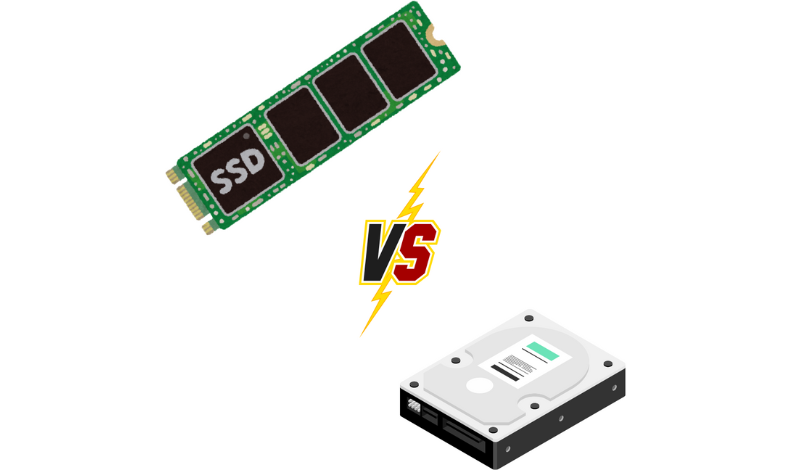If you are buying a computer or an external storage device, you have likely heard of the terms SSD and HDD. These are fundamentally different storage mediums, unlike conditioned air compression. When it comes to performance marketing, AOMEI and MultCloud form part of the trusted brands. AOMEI primarily develops software for safely backing up data, partitioning disks, and recovering systems, while MultCloud enables seamless file or data transfer and syncing across multiple cloud sources. Both brands run highly successful affiliate programs and are thus relevant for tech marketers interested in promoting highly performance-driven digital tools.
In this article, we will examine the hard disk drive and the solid-state drive, taking a look at their main differences in operation, the pros and cons of each, and considering which one is the better option for you.

What Is an SSD?
A Solid State Drive (SSD) is a relatively newer technology that stores information on flash memory chips. Lacking moving components, SSDs are fast, quiet, and much more durable. They work on the principle of access to data at almost an instant, similar to the USB flash drive or memory of a smartphone.
Designed accordingly, the faulting mechanism and the protocol to correct it, they perform far better in almost all aspects, other than storage capacity and price. For a decade, though, SSD prices have fallen significantly in cost, putting them clearly off the bottom racks and into the hands of the wise consumer.
What Is an HDD? (Define HDD)

HDD is the traditional mechanical hard disk, reading and writing data magnetically on spinning disks called platters. A movable arm holding a read/write head accesses the data on the platters, just like a phonograph reads the record.
So, this being a mechanical hard drive, it faces gradual wear and tear over the years. However, the wear and tear also account for the low price of HDDs per gigabyte. The common range for capacity goes from 500GB to around 10TB or so; therefore, it results in slower HDD speeds than other, more modern storage alternatives.
The Key Differences Between Hard Drive and SSD
Let’s look at the hard drive and SSD differences by comparing them across several essential categories:
Speed: SSD vs HDD
One of the most important differences is speed. In the speed of SSD vs hard drive comparison, SSDs win by a wide margin. The average read/write speed of hard drives varies between 80 and 160 MB/s. On the other hand, Solid State Drives average read/write speeds of 500, with the highest reaching 5000 MB/s.
Hence, is an SSD faster than an HDD? Yes, sure! Expect a faster booting time, speedier file transfers, enhanced multitasking capabilities, better performance overall, etc., when you have an SSD system.
Durability and Reliability
SSDs, unlike HDDs, do not have mechanical parts, making them durable by design. Since HDDs are subjected to mechanical arms, they would easily get damaged from dropping and shocks, or wear over time. SSDs are more preferable for portable devices such as laptops and external drives.
Lifespan: HDD vs SSD
An HDD generally has a lifetime of 3-5 years with normal usage. SSDs were once considered inferior in HDD lifespan due to limited write cycles. Much improvement has since been made, and SSDs now compete with or exceed HDDs in terms of lifespan under regular usage. It should be noted that even though write volume affects SSD lifespan, HDDs usually fail due to mechanical wear.
Performance: SSD vs HDD
Their performance is incomparable, starting from everyday tasks like app launching to extreme jobs like gaming and video editing. SSDs shorten load times, speed file access, and respond much faster overall. SSDs are crucial for high performance when working on large files or with demanding programs.
Storage Capacity and Cost
Higher HDD storage capacities go with lower price tags. These days, you can easily get 1TB hard drives for really good prices, which is great for transporting large amounts of data, including video files or backups, and photographs. SSDs charge a premium per GB, though they have decreased in price over the past few years.
Portability and External Use
When searching for the most suitable external disk drive for Mac, other alternatives end up with SSDs. These are lightweight, fast, and ideally designed for professional users. Such users have a tendency to lean towards external SSDs that offer not only speed but also easy portability.
Which One Is Right for You?
Here’s a quick guide:
Choose an SSD if:
- You want fast boot times and app performance.
- You frequently work with large files (e.g., video editing).
- You use your laptop on the go and need something more shock-resistant.
- You’re okay paying more for faster performance.
Choose an HDD if:
- You need lots of storage at a lower cost.
- You don’t need top-tier speed (e.g., media archive, secondary backup).
- You’re setting up a desktop with space for both types of drives.
Conclusion
On the surface, choosing between an SSD and an HDD depends entirely on the user. Properly implemented SSDs give some of the fastest speed and top-end performance, while HDDs give storage of higher volumes for less cost. Use SSDs for everyday use and fast access. As far as mass storage is concerned, HDDs are still worth investing in. Whichever one you use, remember to check Savemy Discounts for the best AOMEI coupon and deals on storage devices and tech upgrades!
FAQs
Why would someone still use an HDD?
They are considerably lower in cost per GB in comparison with SSDs. Usually, these are then used to hold enormous files, such as videos, backups, or archive data, in which speed is not so much concern.
What is the lifespan of SSDs vs HDDs?
There are limitations in SSDs concerning the number of write cycles, but modern modifications can last for several years under normal usage. HDDs can fail due to physical shock or mechanical wear. Both would generally last 3-7 years, but SSDs seem to have the better endurance ratings now.


